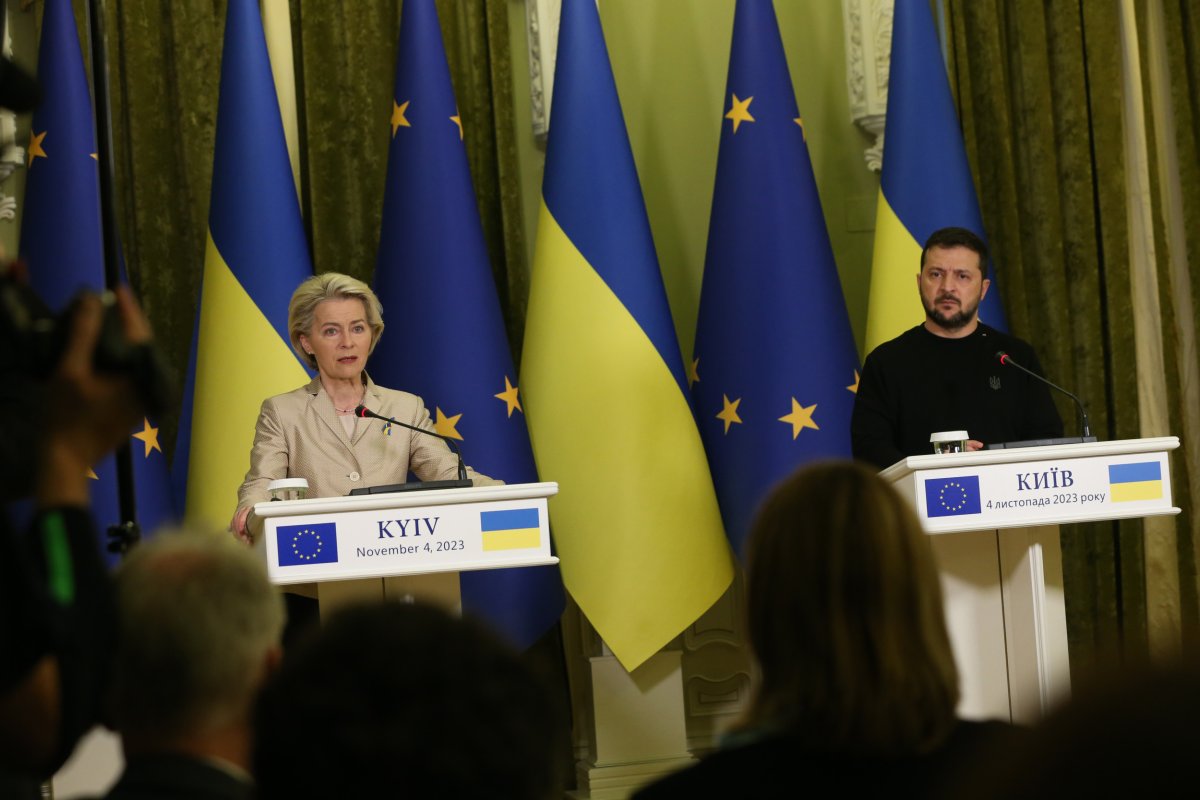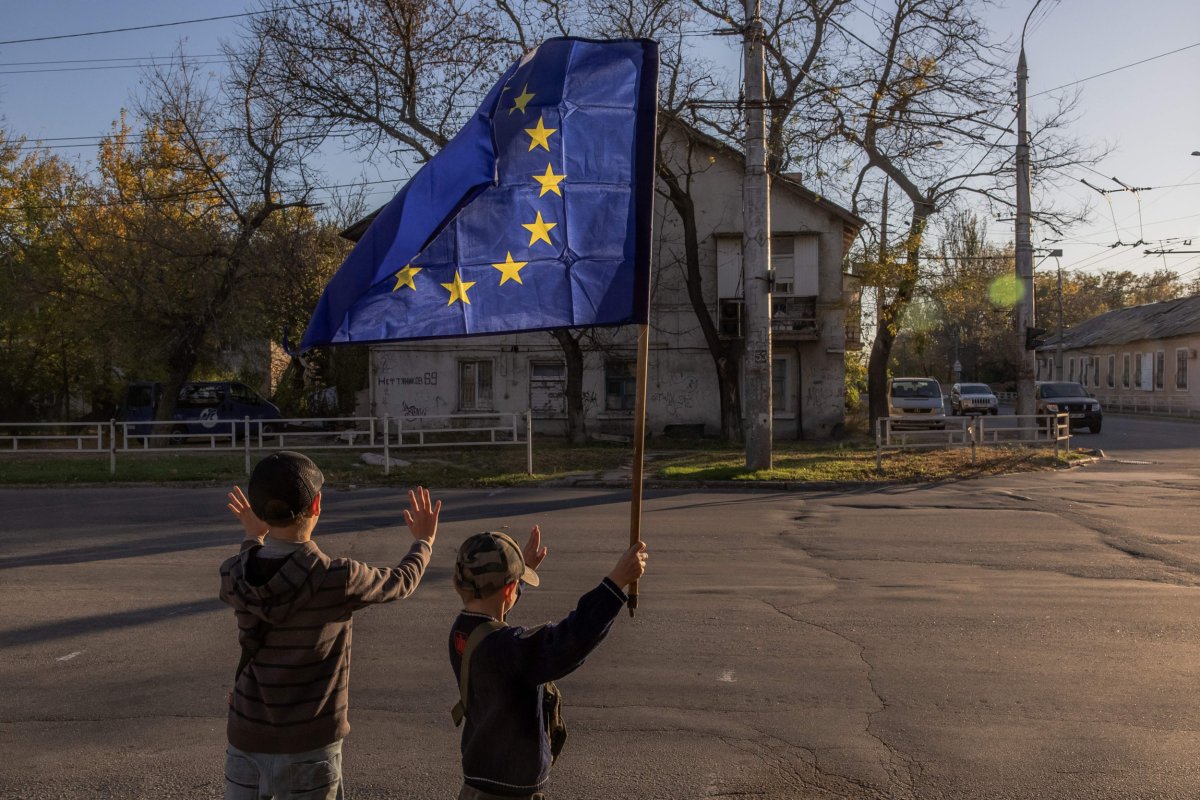Ukraine's European Union ambitions received a significant boost on Wednesday when the European Commission recommended that EU national leaders begin membership talks with Kyiv as soon as it completes its required seven-pronged reform effort.
"In light of the results achieved by Ukraine and Moldova, and of the ongoing reform efforts, the commission has recommended that the council opens accession negotiations with both countries," the Commission announced in its report on the progress of the two nations.
EU and NATO membership have long been key Ukrainian ambitions and enshrined in the national constitution. Russia's full-scale invasion of the country—among the Kremlin justifications of which was Ukraine's growing cooperation with NATO—has only deepened public support for joining both Western blocs.

"Ukraine has completed well over 90 percent of the necessary steps that we set out last year in our report," Commission President Ursula von der Leyen said.
She added: "Ukrainians are deeply reforming their country and preparing for accession, even as they are fighting an existential war. Today the Commission recommends that the Council opens accession negotiations with Ukraine."
The recommendation represents an important win for Ukraine some 18 months after its official application to join the bloc. But this week's commission report is only one small step in a long journey to full membership that may last for several years.
Ukraine will now seek to complete the three remaining reform demands—of the seven set out earlier this year—before opening talks with the European Council, which consists of EU national leaders. The council will meet in mid-December to decide whether to adopt the commission's recommendation and begin negotiations.
Kyiv is still facing a long road to joining the world's largest trading bloc. Ukraine has already met EU demands on constitutional court reform, judicial reform, media legislation, and money laundering restrictions. Ukraine is yet to check off the required anti-corruption, anti-oligarch, and minority rights measures.
Still, President Volodymyr Zelensky on Wednesday lauded the "strong and historic step that paves the way to a stronger EU with Ukraine as its member."
Oleksandr Merezhko, a member of the Ukrainian parliament and the chair of the body's foreign affairs committee, told Newsweek that the commission's positive recommendation "is tremendously important."
"Ukraine, since the declaration of its independence in 1991, has been striving to become a fully-fledged member of the European community," Merezhko said. "It's our civilizational choice which confirms that Ukrainians, as a nation, belong to the European culture.
"The decision of the European Commission boosts our morale and makes our goal to become an EU member real. I'm sure that this decision will contribute to providing more aid to Ukraine in its struggle against Russian aggression.
"It's a powerful signal of support to Ukraine and a sign of appreciation of the fact that Ukraine is now defending the whole of Europe. Simultaneously, it's a huge blow to [Russian President Vladimir] Putin who hoped that the EU would get tired of Ukraine. It's also a sign that the EU values radical reforms in Ukraine."
It remains unclear how long it might take for Ukraine to join the EU, assuming the council does agree to open negotiations with Kyiv early next year. Ukraine and Moldova both won candidacy status—a step on the road to opening negotiations—in June 2022, around four months after applying to join the union.
Kyiv and Moldova, according to Pew Research Center data, completed the transition from EU applicant to candidate 11 times faster than the average member.
However, the negotiation phase is traditionally the most drawn out, taking candidate nations an average of around four years to complete. Though Austria, Finland, and Sweden all completed accession negotiations in fewer than 18 months, the complications of Ukraine's war with Russia might mean that talks with Kyiv take longer than most.
There are also concerns that a "frozen conflict" with Russia might indefinitely delay a potential accession, in the same way that Moscow's occupation of swathes of Kyiv's territory since 2014 has hindered Ukraine's foreign policy progress.

Matti Maasikas, who until June was the EU ambassador to Ukraine, told Newsweek in May that the bloc would not allow a frozen war to prevent Kyiv from joining.
"In the biggest, and if you will, gravest issues, the EU is very united and has been united throughout this full-scale war because the situation is so grave," Maasikas said.
Bilateral tensions with existing member states, though, might hinder the process. Already, Hungary is positioning itself as an obstacle. Populist Prime Minister Viktor Orban has already threatened to torpedo talks over Budapest's long-running dispute with Kyiv regarding the rights of Hungarian minority communities in Ukraine.
Orban—long a thorn in the EU's collective side—might be joined in his spoiler role by newly-elected Slovakian Prime Minister Robert Fico, who won September's election running on a platform opposed to continued EU-NATO support for Kyiv.
"In the Hungarian government's view, there can be no talks aiming to admit a country at war to the EU, as there has never been such a case before," a spokesperson for Orban's office told Newsweek. "On the other hand, negotiations with the countries already waiting to be admitted must be concluded first."
Budapest's stance will only deepen Ukrainian enmity to its western neighbor. "Hungary is acting in a very indecent way," Merezhko said. "Ukraine is bleeding and defends—at a high price—Europe, including Hungary, while Orban is trying to squeeze something out for himself instead of aiding Ukraine."
"I still cannot understand why Ukraine, which is fighting hard for European values, is out of the EU, whereas Hungary which systematically undermines European values is still in the EU," Merezhko added. "It should be vice versa. Such behavior by Hungary will go down in history as extremely selfish and unethical."
Update: 11/8/23 2:35 p.m. ET: This article has been updated to include a response from the Hungarian government.
Uncommon Knowledge
Newsweek is committed to challenging conventional wisdom and finding connections in the search for common ground.
Newsweek is committed to challenging conventional wisdom and finding connections in the search for common ground.
About the writer
David Brennan is Newsweek's Diplomatic Correspondent covering world politics and conflicts from London with a focus on NATO, the European ... Read more
To read how Newsweek uses AI as a newsroom tool, Click here.






